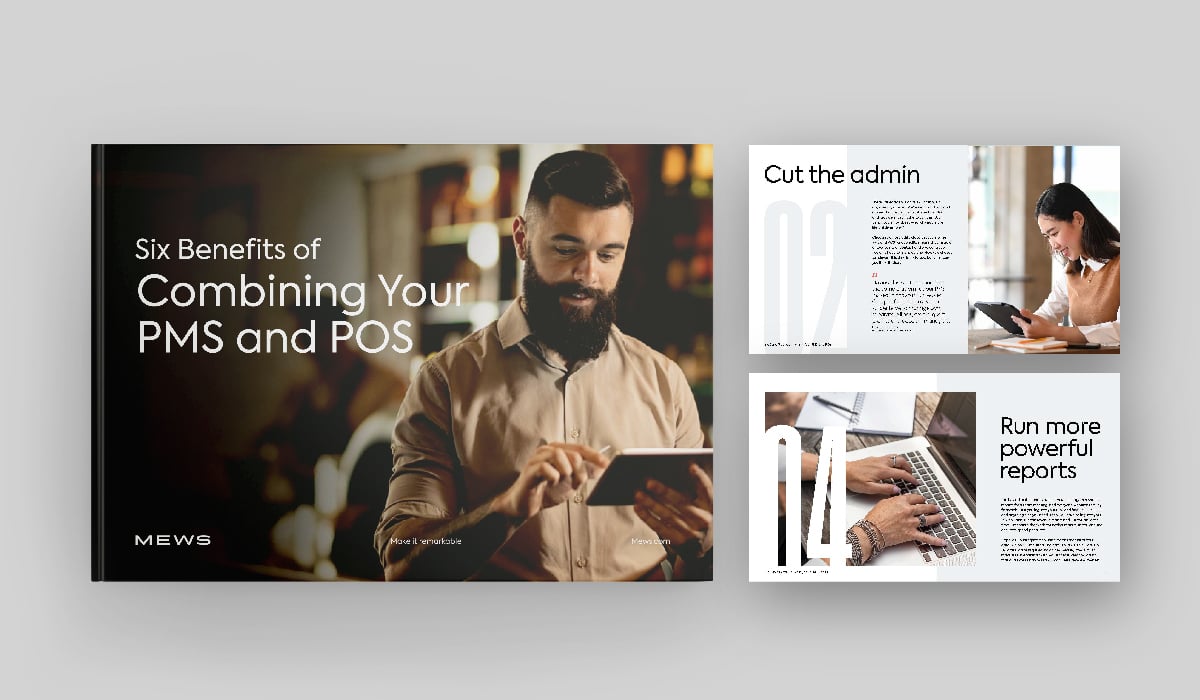POS reporting can boost your hotel’s growth by giving important insights as to your top performing departments, employees and times of day for making sales. This way you can make data-driven decisions about how to drive sales, where to invest your marketing budget, and how to better manage your staff shifts. If your hotel has a restaurant, you can boost sales by understanding your top-selling dishes.
Since having a bird’s eye view of your payment panorama is such an important part of profitability, we will look at POS reporting more in detail, the benefits of POS reporting, and the main point of sale reports that you can use as a hotelier. So, let’s get started.
Table of contents
What is POS reporting?
POS reporting is a collection of business insights that you can obtain from your point of sale device based on information that’s stored in your system. If you’re working with an ePOS, then you can log in to the cloud and your reports will be automatically generated, showing you information such as amount of sales, sales by any given department or employee, inventory reports, and employee transactions.
Based on this information you can drive important conclusions about your top-performing employees and departments, up-to-date information about the status of your inventory, payments received, track top guests, and other important sales information, which we will discuss more in detail below.
What are the benefits of POS reporting for your business?
There are many benefits of POS reports for your hotel, and when used right, they can be a powerful tool for optimizing processes at your hotel and driving revenue. Let’s take a look at some more of the benefits.
Customize marketing activities
When you delve into the different reports provided by your point of sale, you can better understand how to customize your marketing activities in many ways. For starters, you can determine which repeat guests are providing limited daily value to your hotel, and promote other services and activities that can boost their daily spend. Maybe you can offer them a discount on a spa treatment, so they can discover how great your hotel’s services are.
Discover how to boost ancillary revenue.
You can also determine which sectors of your hotel are underperforming and create activities that will help drive revenue in these sectors. For example, if your hotel’s restaurant is not driving enough sales, consider offering discounts so that more people will visit the restaurant during their stay. If you find a guest that typically helped generate a lot of sales hasn’t visited you in a while, you can consider offering them a discount to come back and visit.
Improve the customer experience
With a hotel restaurant POS, you can create reports that you can use to help you understand and create guest profiles that will help you to improve the customer experience at your hotel. If you have repeat guests, you can greet them by their name and even provide special perks or in-room treats to make them feel special and keep them coming back.
Better understand crucial numbers
Generating enough revenue is crucial to a hotel’s profitability. This is why POS reporting is a great way to help you understand the numbers and pinpoint inefficiencies. With reports, you can track total sales volume, your gross profits, the best days of the week and the best-selling services at your hotel. This way, you can create targeted sales and marketing activities to help boost these crucial numbers.
Learn more about using data to improve sales.
Drive staff productivity
By looking at employee reports, you can get an idea of which employees are performing the best and which are underperforming so that you can potentially promote the employees that perform the best, and create an action plan for those who are not having good results. The happier your team is, the more productive they will be. For this reason, using the insights on staff performance in the employee reporting is crucial to successful operations.
If you find that during a certain period of time, there are not a lot of sales at the restaurant, you can reduce the amount of staff and reschedule during peak hours. They will be more productive when there is more to do, and you will not waste money on unnecessary resources. POS reports help you find the perfect balance for the amount of staff you have working during any given period to optimize resources and cut costs where necessary.

The five main point of sale reports for a hotel
Now that we’ve understood the benefits of point of sale reports, let’s take a look at the main types of reports that a POS offers you.
1. Payment reports
Payment reports allow you to check the amount of card payments vs cash or online payments, track chargebacks to easily identify fraud or poor performance, and see refunds, which help you identify potential problems. You can also determine which sectors of your hotel are performing the best, in order to provide extra attention to underperforming sectors.
2. Sales reports
The sales report is one of the most important of all in order to understand your hotel’s bottom line, and whether your hotel is generating enough revenue to be profitable. You can determine total daily, monthly, weekly and monthly sales to see when is the most profitable time for your hotel. You can also determine gross profit to get a better idea of sales.
3. Customer reports
Understanding guest behavior is crucial to driving profit. With customer reports you can understand better their reservation history, their loyalty program engagement, and keep track of regular guests and their purchase history. The better you understand your guests’ behavior, the better you can exceed their expectations. Find out more about how to exceed guest expectations.
4. Inventory reports
Inventory reports are especially important for driving profitability at your hotel’s restaurant and diminishing waste of perishable goods. You can also get a better idea of expected stock vs actual stock to determine inefficiencies. Using your POS to control inventory also helps control and maximize profitability.
5. Employee reports
Employee reports help you to understand who are your best performing employees, the total tips received, and how many hours they worked to better calculate tips and pay. Understanding your best performing employees is crucial in order to properly promote them, motivate those who are not performing well, and to get an idea of when to schedule which employees based on their productivity.
Conclusion
We’ve looked at the importance and benefits of POS reporting, as well as the main types of point of sale reports that you should leverage to improve your hotel’s profitability. Data insights will help you make better decisions that will help you to drive sales and boost your average daily rate, while at the same time promoting loyalty by truly understanding guest behavior.
Six Benefits of Combining Your PMS and POS
Now that you know how POS reporting can improve your hotel's growth, discover why choosing a hospitality cloud with a built-in POS creates a more seamless guest experience and streamlines processes for your teams. 

Author
Eva Lacalle
Eva has over a decade of international experience in marketing, communication, events and digital marketing. When she's not at work, she's probably surfing, dancing, or exploring the world.

Essential hotel technology for general managers
Download now
Hospitality hot takes straight to your inbox


.webp)